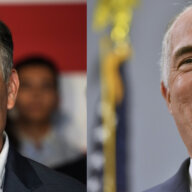 Members of the Philadelphia Game Forge pose at their coworking space in Old City. Credit: Charles Mostoller/METRO
Members of the Philadelphia Game Forge pose at their coworking space in Old City. Credit: Charles Mostoller/METRO
Ash Monif looks at Philadelphia and its tech scene and sees one glaring weakness: it’s the only major metropolitan American city without a major video game development studio.
“And the reason is ironic because you have all of the right elements for this to become a technical gravity hub especially for video games, but it’s just not happening,” he said.
Monif, who recently returned from a trip across Europe along with members of his team, Grimm Bros., promoting their latest video game “Dragon Fin Soup,” said the infrastructure is here: notable game development programs at the University of Pennsylvania and at Drexel University, for one. But most leave for California or New York because that’s where the jobs are located.
The talent and universities are here and the cost of living is low, Monif said, space is plentiful and there is easy access to New York.
“But one of the things that is not competitive at all,” he added, “is any tax breaks.”
Last week local developers met with legislators who asked what the developers needed to bring more jobs to Philly. Essentially: They need help, support, and tax breaks to grow a business.
This isn’t new to Frank Lee, director of Drexel University’s Entrepreneurial Game Design Studio, who has been working since the mid-2000s to encourage the growth of the video game industry in Philadelphia.
“It’s more of a vision I have of wanting to really have a vibrant gaming industry in Philadelphia so that my students could have options,” he said last week. “But they end up leaving. … They have to go somewhere else.”
 Mila Pokorny, art-director of Quadratron, a game company working on a new game called Wizards! Beards of Power, which is set to release in 2015. Credit: Charles Mostoller/METRO
Mila Pokorny, art-director of Quadratron, a game company working on a new game called Wizards! Beards of Power, which is set to release in 2015. Credit: Charles Mostoller/METRO
Last year Lee was helping to push a bill in the state legislature to establish tax credits for video game companies in the state, but it wasn’t signed into law.
“So we’re trying again,” he said.
Multiple sources have said that universities could potentially see support from the state to help build the gaming industry specifically in the city, but a request for comment from Gov. Corbett’s office was not returned.
Tom Corbett’s son, incidentally, is in the gaming industry.
The younger Corbett, who earned a master’s degree out of Carnegie Mellon University’s Entertainment Technology Center, works as a project manager for Electronic Arts. The California-based company is known for producing the wildly successful Madden NFL franchise.
“So (Corbett) is sympathetic,” Lee said. “The legislators are very sympathetic, because it’s a huge, huge industry. It’s estimated to be between $82 and $100 billion globally in 2014.”
And Philadelphia only has a very negligible piece of that.
“So there’s only room to grow,” Lee said. “There is a potential here. … And the change in the industry helped.”
Before 2008, before the iPhone app store and the birth of the mobile industry, game developers had to work with publishers who had the relationships with retailers to get their games on the shelves. With the Apple app stores, the middle man was removed from the equation, and a new business model was born: any developer could become a publisher
This led to the rise of mobile platform, and the rise of independent games. However, because mobile games are either free or come at a reduced rate, gamers aren’t yet seeing their hard work pay off.
Tony Allen Rowe, a Philly-based mobile game designer, is known best as one of the original designers on the first iteration of the hugely successful Call of Duty video game.
Rowe, a newly christened father, said he wants to stay in the area.
But what would keep him here?
“A studio that could pay health benefits would be a good start,” he said.
 Zenas Bellace, founder of Quadratron, a game company working on a new game called Wizards! Beards of Power, which is set to release in 2015. Credit: Charles Mostoller/METRO
Zenas Bellace, founder of Quadratron, a game company working on a new game called Wizards! Beards of Power, which is set to release in 2015. Credit: Charles Mostoller/METRO





























